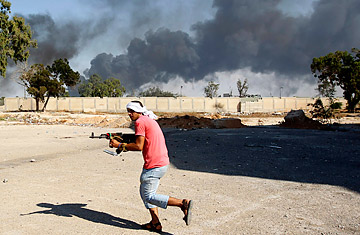
A Libyan rebel fighter runs as smoke rises from Muammar Gaddafi's Bab al-Aziziyah compound in Tripoli, Libya, on Aug. 23, 2011
If one of the first casualties of the six-month-old uprising in Libya was Italy's relationship with Libyan strongman Muammar Gaddafi, one of the first dividends of its conclusion could be renewed ties between Rome and whoever replaces the fallen dictator. Even as gunshots continued to ring out in the streets of Tripoli, Italian Prime Minister Silvio Berlusconi was on the phone with Mahmoud Gebril, Prime Minister of the anti-Gaddafi National Transitional Council (NTC), congratulating him on the rebels' rapid advance on the Libyan capital, promising him Italian support and warmly inviting him for a visit. "The National Transitional Council and all the combatants involved in Tripoli are realizing their aspiration for a new, united, democratic Libya," Berlusconi said in a statement. "The Italian government is at their side."
The last time a Libyan leader visited Italy, he took an entourage of hundreds of people and pitched a tent in the grounds of one Rome's historic villas. As long as Gaddafi ruled Libya, Berlusconi was bent on pleasing him. Before fighting broke out in February, Libya was Italy's largest provider of oil and gas, providing roughly a third of Italy's oil production to the country. Gaddafi's government owned substantial shares of Italian companies, including 7.5% of UniCredit, the largest bank in Italy, and 7% of the Torino-based Juventus soccer club. In 2009, Gaddafi was given a seat at the table during the G-8 summit in Italy. And at one point, Berlusconi leaned down to kiss his hand.
Gebril's visit, which could take place as early as Thursday in Milan, is likely to be less extravagant and kitschy. But for Berlusconi's government, it's likely to be no less momentous. Libya is a former Italian colony, in which it remains heavily invested (including a Gaddafi-era guarantee of $5 billion of Italian infrastructure projects in the country). The Italian petroleum company Eni is the largest foreign oil investor in Libya and, according to Italy's Foreign Minister Franco Frattini, its workers have already landed on the ground in Libya, looking to restart its oil facilities. "We are optimistic," says Maurizio Massari, Frattini's spokesperson. "We have received repeated assurance from the NTC that they will respect international obligations — contracts with oil companies and so on." Eni declined to comment on the Foreign Minister's statement, except to say it would take at least two months to restart gas production and as long as a year before the oil would be flowing once again.
Rome also relies on Libya to keep a tight control on immigration — from the North African state across the Mediterranean to southern Italy. Since the fighting began, the harsh measures employed by Gaddafi to stop departures by sea have collapsed, allowing tens of the thousands to make the dangerous journey across the waves. Berlusconi's government has been eager to restart patrols at sea and on land, going as far as to begin training Libyan rebels for jobs as coast guards and in border control. "Training will be an important component of our indirect role in ensuring the stability of the transition," says Massari.
Meanwhile, the country is also playing host to another potential post-civil-war leader, Abdul Salam Jalloud, a former Libyan Prime Minister and close aide to Gaddafi, who defected from Libya on Aug. 20. The Italian government has been loud in its calls for reconciliation between Libya's rebels and some elements of the Gaddafi regime to prevent the country from tumbling into a cycle of violent retaliation. The Libyan rebels "have to create incentives for as many people as possible in Libya, including those who were working in the regime's administration," says Massari. "Those who have not personally committed crimes need to be reincorporated into the new democratic administration."
For Italy, it's a strategy that could pay double dividends: allowing the country to maintain some of its former contacts in the country while lowering the chance the country would descend into chaos as reprisals have gutted the police and civil service. The signs so far are largely positive. In their march on Tripoli, the rebel fighters have refrained from large-scale acts of retaliation. The welcome they received on the streets of the capital, when thousands poured out in celebration, will go a long way toward healing the hatred of those they might have otherwise regarded as an enemy.
